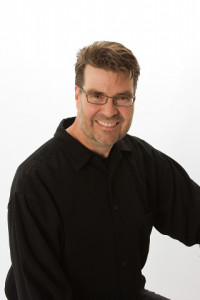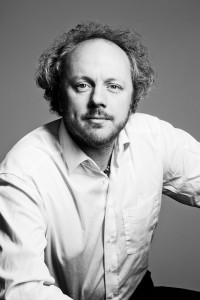Advances and Trends in Augmented Reality Systems
Dieter Schmalstieg | Institute for Computer Graphics and Vision | Graz University of Technology, Austria
Abstract: Augmented Reality is an emerging new medium, with the potential of becoming very important for any kind of mobile computer use. However, creating Augmented Reality applications that go beyond proof of concept is very challenging, as it requires the successful combination of many non-trivial elements: The technology must be real-time, human-in-the-loop, accurate and precise, context-aware, and work outdoors, operated by potentially naive users. The talk will draw examples from 20 years of experience in Augmented Reality research to highlight trends and directions for future real-world systems.
Bio: Dieter Schmalstieg is full professor and head of the Institute for Computer Graphics and Vision at Graz University of Technology, Austria. His current research interests are augmented reality, virtual reality, computer graphics, visualization and human-computer interaction. He received Dipl.-Ing. (1993), Dr. techn. (1997) and Habilitation (2001) degrees from Vienna University of Technology. He is author and co-author of over 300 peer-reviewed scientific publications with over 10,000 citations, with over ten best paper awards and nominations. His organizational roles include associate editor in chief of IEEE Transactions on Visualization and Computer Graphics, member of the editorial advisory board of computers & graphics and of the Springer Virtual Reality journal, member of the steering committee of the IEEE International Symposium on Mixed and Augmented Reality, chair of the EUROGRAPHICS working group on Virtual Environments (1999-2010), key researcher of the K-Plus Competence Center for Virtual Reality and Visualization in Vienna and key researcher of the Know-Center in Graz. In 2002, he received the START career award presented by the Austrian Science Fund. In 2012, he received the IEEE Virtual Reality technical achievement award for seminal contributions to the field of Augmented Reality. He was elected as a senior member of IEEE, as a member of the Austrian Academy of Sciences and as a member of the Academia Europaea. Since 2008, he is also director of the Christian Doppler Laboratory for Handheld Augmented Reality.
Ten Thousand Channels to Ten Million Viewers: Technologies for Scaling Video Delivery over IP
Neill A. Kipp | Distinguished Engineer | Comcast VIPER
Abstract: Comcast’s Video IP Engineering and Research (VIPER) team is responsible for delivering tens of thousands of IP linear television channels and thousands of hours of on-demand content to tens of millions of users using a highly scalable, multi-tier software and network architecture. Adaptive bitrate (ABR) technologies such as DASH (ISO 23009-1) let us originate and deliver video segments as internet objects that are conveniently retrieved, stored, and forwarded using HTTP. With an ABR platform, we can experiment with encoding technologies such as H.264 (MPEG-4 AVC), H.265 (HEVC), and high dynamic range (HDR). We use multimedia presentation technologies to implement an interactive and compelling user experience to our customers, while our alternate content systems require metadata, signaling, splicing, scaling, and reporting that is an order of magnitude more complex than primary video delivery. Comcast continues to solicit, utilize, and share contributions from open source communities, standards bodies, and especially academic researchers for the technologies that make our IP video system possible.
 Biography: Neill A. Kipp is a Distinguished Engineer for Comcast VIPER. Kipp developed VIPER’s Super8 packager that serves IP video to Xfinity apps. Kipp was Honorarium Instructor in Computer Science at the University of Colorado Denver where he taught graduate-level courses including Object Design, User Experience Design, and Ubiquitous Computing. No stranger to the podium, Kipp is an charismatic speaker who has engaged audiences at dozens of technical conferences, including ApacheCon, ACM, Java, Seybold, and SCTE.
Biography: Neill A. Kipp is a Distinguished Engineer for Comcast VIPER. Kipp developed VIPER’s Super8 packager that serves IP video to Xfinity apps. Kipp was Honorarium Instructor in Computer Science at the University of Colorado Denver where he taught graduate-level courses including Object Design, User Experience Design, and Ubiquitous Computing. No stranger to the podium, Kipp is an charismatic speaker who has engaged audiences at dozens of technical conferences, including ApacheCon, ACM, Java, Seybold, and SCTE.
5G enabling the Tactile Internet
Frank H. P. Fitzek | Communication Networks Group | Technische Universität Dresden
Abstract: The tactile Internet will enable a global network to control and steer the Internet of Things in real time. 5G will be the first generation of mobile communication systems that will enable the tactile Internet. The talk will advocate the need for the tactile Internet and describe the need for new technologies such as network coding and compressed sensing to break with the commonly accepted trade-offs between throughput, latency, resilience, and security. The talk will also highlight the change from purely centralized architectures to meshed solutions.
 Biography: Frank H. P. Fitzek is a Professor and chair of the communication networks group at Technische Universität Dresden coordinating the 5G Lab Germany. He received his diploma (Dipl.-Ing.) degree in electrical engineering from the University of Technology – Rheinisch-Westfälische Technische Hochschule (RWTH) – Aachen, Germany, in 1997 and his Ph.D. (Dr.-Ing.) in Electrical Engineering from the Technical University Berlin, Germany in 2002 and became Adjunct Professor at the University of Ferrara, Italy in the same year. In 2003 he joined Aalborg University as Associate Professor and later became Professor. He co-founded several start-up companies starting with acticom GmbH in Berlin in 1999. He has visited various research institutes including Massachusetts Institute of Technology (MIT), VTT, and Arizona State University. In 2005 he won the YRP award for the work on MIMO MDC and received the Young Elite Researcher Award of Denmark. He was selected to receive the NOKIA Champion Award several times in a row from 2007 to 2011. In 2008 he was awarded the Nokia Achievement Award for his work on cooperative networks. In 2011 he received the SAPERE AUDE research grant from the Danish government and in 2012 he received the Vodafone Innovation price. In 2015 he was awarded the honorary degree “Doctor Honoris Causa” from Budapest University of Technology and Economy (BUTE). His current research interests are in the areas of wireless and mobile 5G communication networks, mobile phone programming, network coding, cross layer as well as energy efficient protocol design and cooperative networking.
Biography: Frank H. P. Fitzek is a Professor and chair of the communication networks group at Technische Universität Dresden coordinating the 5G Lab Germany. He received his diploma (Dipl.-Ing.) degree in electrical engineering from the University of Technology – Rheinisch-Westfälische Technische Hochschule (RWTH) – Aachen, Germany, in 1997 and his Ph.D. (Dr.-Ing.) in Electrical Engineering from the Technical University Berlin, Germany in 2002 and became Adjunct Professor at the University of Ferrara, Italy in the same year. In 2003 he joined Aalborg University as Associate Professor and later became Professor. He co-founded several start-up companies starting with acticom GmbH in Berlin in 1999. He has visited various research institutes including Massachusetts Institute of Technology (MIT), VTT, and Arizona State University. In 2005 he won the YRP award for the work on MIMO MDC and received the Young Elite Researcher Award of Denmark. He was selected to receive the NOKIA Champion Award several times in a row from 2007 to 2011. In 2008 he was awarded the Nokia Achievement Award for his work on cooperative networks. In 2011 he received the SAPERE AUDE research grant from the Danish government and in 2012 he received the Vodafone Innovation price. In 2015 he was awarded the honorary degree “Doctor Honoris Causa” from Budapest University of Technology and Economy (BUTE). His current research interests are in the areas of wireless and mobile 5G communication networks, mobile phone programming, network coding, cross layer as well as energy efficient protocol design and cooperative networking.
